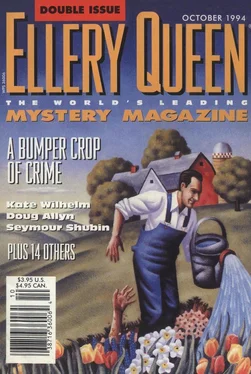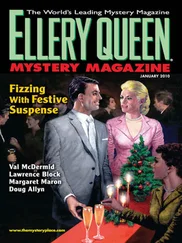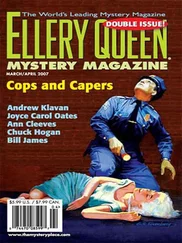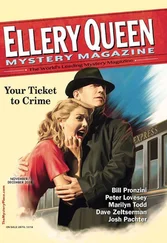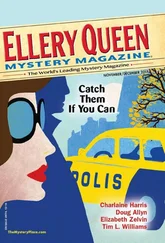Doug Allyn - Ellery Queen’s Mystery Magazine. Vol. 104, No. 4 & 5. Whole No. 633 & 634, October 1994
Здесь есть возможность читать онлайн «Doug Allyn - Ellery Queen’s Mystery Magazine. Vol. 104, No. 4 & 5. Whole No. 633 & 634, October 1994» весь текст электронной книги совершенно бесплатно (целиком полную версию без сокращений). В некоторых случаях можно слушать аудио, скачать через торрент в формате fb2 и присутствует краткое содержание. Город: New York, Год выпуска: 1994, ISBN: 1994, Издательство: Dell Magazines, Жанр: Детектив, на английском языке. Описание произведения, (предисловие) а так же отзывы посетителей доступны на портале библиотеки ЛибКат.
- Название:Ellery Queen’s Mystery Magazine. Vol. 104, No. 4 & 5. Whole No. 633 & 634, October 1994
- Автор:
- Издательство:Dell Magazines
- Жанр:
- Год:1994
- Город:New York
- ISBN:ISSN 1054-8122
- Рейтинг книги:4 / 5. Голосов: 1
-
Избранное:Добавить в избранное
- Отзывы:
-
Ваша оценка:
- 80
- 1
- 2
- 3
- 4
- 5
Ellery Queen’s Mystery Magazine. Vol. 104, No. 4 & 5. Whole No. 633 & 634, October 1994: краткое содержание, описание и аннотация
Предлагаем к чтению аннотацию, описание, краткое содержание или предисловие (зависит от того, что написал сам автор книги «Ellery Queen’s Mystery Magazine. Vol. 104, No. 4 & 5. Whole No. 633 & 634, October 1994»). Если вы не нашли необходимую информацию о книге — напишите в комментариях, мы постараемся отыскать её.
Ellery Queen’s Mystery Magazine. Vol. 104, No. 4 & 5. Whole No. 633 & 634, October 1994 — читать онлайн бесплатно полную книгу (весь текст) целиком
Ниже представлен текст книги, разбитый по страницам. Система сохранения места последней прочитанной страницы, позволяет с удобством читать онлайн бесплатно книгу «Ellery Queen’s Mystery Magazine. Vol. 104, No. 4 & 5. Whole No. 633 & 634, October 1994», без необходимости каждый раз заново искать на чём Вы остановились. Поставьте закладку, и сможете в любой момент перейти на страницу, на которой закончили чтение.
Интервал:
Закладка:
At arm’s length were two galleys of type. Though made up of hundreds of separate elements, they looked like solid rectangles of lead. His hand brushed over the closest galley, pushing down several letters which had worked up higher than the rest. From this evenness he’d often derived a sense of order that helped prepare him for the start of a long workday, but this morning his heart felt as if it were filled with a fistful of the weighty type.
Four months earlier, after a brief courtship, the printer had taken a wife. It was during the time he’d come into his own as a printer, after years of apprenticeship, when he was commissioned to set in type and print stories by a brooding, reclusive author who lived not far from his shop. As soon as the couple had carried their belongings into the white cottage on the leaf-strewn lane, it seemed to the printer that his bride began to behave strangely, often unaware of what went on around her, absorbed in her own thoughts. The groom had become increasingly uneasy, yet he cherished his wife above all else, and desired to reach across the dark gap that seemed to lie between them like a freshly dug grave.
The previous night the printer’s wife had moaned repeatedly in her sleep, and once had even cried out, startling him. A wave of protectiveness had carried over him as he lay beside her under the broad quilt, which had been pieced together as a wedding gift by the patient hands of his mother. But the printer slept very little the rest of the night. His father, with whom he’d served his apprenticeship, slept more peacefully on his hill at the foot of a round-shouldered granite marker.
At dawn, when the printer and his wife arose, he asked her what fearsome dreams had troubled her sleep. Her eyes moistened, but she would give him no answer so, shaking his head, the printer dressed and pulled on his boots. When he had finished a breakfast of tea and fresh-baked bread, he took his wife’s hand and explained that he must go — that the author was coming to his shop with another tale to set in type.
Exhaling puffs of white air, the printer placed the wooden composing stick across the palm of his left hand. Before beginning to set the type he gazed out the window. The low sun was bundled in charred clouds, casting a leaden glare over the commons. Not a soul moved about on the brown turf, not even at the village pump. The trees were still. The meetinghouse, shut tight. Leaning forward, he could see the great gabled house set back off the lane, huddled under a veil of crystallized dew. In the topmost window, a candle flickered: The author was already at work.
The printer suppressed a yawn as he centered himself before the wooden type case. Now he studied the handwritten manuscript, held flat by an iron bar, and began plucking individual letters out of the compartments of the case. His hand moved swiftly, assembling the prose. Line after line stacked up like a wall of miniature bricks. Character and scene and plot took shape, but the printer had to give close attention to the accuracy of spelling and punctuation, and so he often could not follow the intrigues he set in type.
Once the composing stick was fully loaded, the printer set it on the counter, gripped the four sides of the type with the fingers of both hands, and slid the type onto a galley. Here it was tied together with linen twine and pushed up against another block of letters that had been set the previous evening. Normally he took satisfaction in this physical record of his labors, but this morning his head throbbed with exhaustion.
Nearly a full page of thirty picas had been set when there came a knock on the door. Except for his own tinkering with the metal and wood, there had been no other sound in the vicinity of the shop. The knocking sounded again, more urgent this time. He had not expected the delivery of the manuscript quite so soon, and he glanced out the window toward the gabled house. The candle in the upper window was still lit. Carefully he laid the composing stick down on the counter, moved to the front of the shop, and unlatched the door.
A square-shouldered stranger loomed in the dimness of early morning. He was draped in a black cloak, and wore a broad-brimmed hat which shaded much of his face. In the clawlike hand was a crooked walking staff.
The printer, surprised, stuttered: “What may I... do for you, sir?”
“I have come to do something for thee.”
Dry leaves rattled in a huckleberry bush beside the door.
“I fear I do not understand.”
“Satan walks among us,” the stranger declared, using his staff to make his way past the printer into the shop.
Uncertain whether to be annoyed or interested, the young printer followed him. “If Satan is your business, why not go down among the black pines, where they say he keeps his fire?”
The stranger eyed the printer icily and replied: “His shadows have been witnessed in your window.”
“My window? That is not possible.”
“It has been reported in good faith.”
“By whom, may I ask?”
“Members of your congregation.”
Forcing a laugh through his nostrils, the printer said, “As you can see, there’s no Beelzebub here.”
The stranger’s green eyes hopped like a pair of toads as they examined the darkest corners of the shop.
“Sir, my work cannot be delayed any longer,” said the printer.
The figure in black shook his staff. “I have come to find Satan, and find him I shall!” he exclaimed loudly. The charged voice and wild gesture reminded the printer of the new minister who preached in their meetinghouse with the passion of a sinner. But this man was too tall, and his clothes curiously antiquated.
Moving deeper into the shop, the stranger leaned over the imposition stone and sniffed the dried ink on its surface. Next he confronted the printing press, though not too closely, raising his eyebrows at its oak frame, its iron lever, its stone bed. In particular he seemed wary of the threaded shaft which created the pressure for the impression.
“Who are you?” the printer demanded.
“Guardian of thy soul.”
“With God’s help I shall keep watch over my own soul.”
A cynical laugh croaked deep in the stranger’s throat. “Against the hand of Satan you cannot possibly succeed.”
The printer stepped toward him. “I must ask you to leave.”
Uttering the Lord’s name, the stranger walked heavily to the counter against the wall, v/here the printer had been composing. He bent over the blocks of type.
“Do not disturb anything!” ordered the printer.
A foul sigh escaped from the stranger’s mouth, and before the printer could stop him, he had reached out and overturned a galley of type. The pieces of lead splashed over the timber-planked floor with an explosive clatter.
“Fiend!” shouted the printer, and grabbed his arm.
Puffing up like a crow in the cold, the stranger pulled away and swung his staff, striking the printer on the side of the head. The young man’s knees buckled and he fell onto the planks. Now the stranger overturned the second galley of type.
The printer pressed the palm of his hand against the side of his head, feeling too dazed and weakened by the blow to get up.
“Satan’s work is undone!” roared the stranger as he flapped out the door.
The silence flowed back, pouring over the worn edges of the press, and the sun, a silvery presence against the gray backdrop of sky, polished the scattered pieces of metal. The printer felt helpless — not against the figure in the cloak but against the rubble of disorder: the countless hours of labor strewn around him. From where he sat shivering on the planks, he could see a row of type that was larger than all the rest, missing letters, out of alignment, yet readable:
Читать дальшеИнтервал:
Закладка:
Похожие книги на «Ellery Queen’s Mystery Magazine. Vol. 104, No. 4 & 5. Whole No. 633 & 634, October 1994»
Представляем Вашему вниманию похожие книги на «Ellery Queen’s Mystery Magazine. Vol. 104, No. 4 & 5. Whole No. 633 & 634, October 1994» списком для выбора. Мы отобрали схожую по названию и смыслу литературу в надежде предоставить читателям больше вариантов отыскать новые, интересные, ещё непрочитанные произведения.
Обсуждение, отзывы о книге «Ellery Queen’s Mystery Magazine. Vol. 104, No. 4 & 5. Whole No. 633 & 634, October 1994» и просто собственные мнения читателей. Оставьте ваши комментарии, напишите, что Вы думаете о произведении, его смысле или главных героях. Укажите что конкретно понравилось, а что нет, и почему Вы так считаете.
